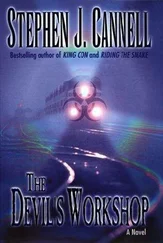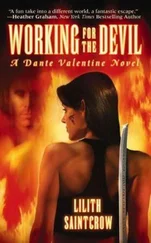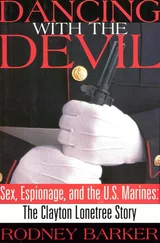Алан Джадд - The Devil's Own Work
Здесь есть возможность читать онлайн «Алан Джадд - The Devil's Own Work» весь текст электронной книги совершенно бесплатно (целиком полную версию без сокращений). В некоторых случаях можно слушать аудио, скачать через торрент в формате fb2 и присутствует краткое содержание. Жанр: sf_mystic, на английском языке. Описание произведения, (предисловие) а так же отзывы посетителей доступны на портале библиотеки ЛибКат.
- Название:The Devil's Own Work
- Автор:
- Жанр:
- Год:неизвестен
- ISBN:нет данных
- Рейтинг книги:3 / 5. Голосов: 1
-
Избранное:Добавить в избранное
- Отзывы:
-
Ваша оценка:
- 60
- 1
- 2
- 3
- 4
- 5
The Devil's Own Work: краткое содержание, описание и аннотация
Предлагаем к чтению аннотацию, описание, краткое содержание или предисловие (зависит от того, что написал сам автор книги «The Devil's Own Work»). Если вы не нашли необходимую информацию о книге — напишите в комментариях, мы постараемся отыскать её.
The Devil's Own Work — читать онлайн бесплатно полную книгу (весь текст) целиком
Ниже представлен текст книги, разбитый по страницам. Система сохранения места последней прочитанной страницы, позволяет с удобством читать онлайн бесплатно книгу «The Devil's Own Work», без необходимости каждый раз заново искать на чём Вы остановились. Поставьте закладку, и сможете в любой момент перейти на страницу, на которой закончили чтение.
Интервал:
Закладка:
Alan Judd
The Devil's Own Work
First published in 1991
Winner of that year's Guardian Fiction Award
Chapter 1
I had it, you see, from Edward himself; though not all at once and never, I am sure, all of it. I don't suppose anyone could tell it all, except perhaps Eudoxie, and she was — is — part of the problem. The origins pre-date my marriage and Edward's fame. I now regard that time as our first youth but it seemed to us then, fresh from university and in London, the time of entry into full estate. Nothing was impossible and nothing unimagined, except failure. In my case you could say that I was merely wrong but Edward's is more complicated. He had every success an ambitious man could wish; it was the cost that got him.
Of course, when he purchased that particular ticket he had no idea — which of us could have? — of what compound interest can mean, over a lifetime. I don't suppose it even felt like a transaction, more another gift from a kindly Providence to add to his health, his looks, his charm, his winning disposition, his talent — his genius, it came to be called, but I at least am more cautious now. Everyone liked, even loved him, or perhaps I should say that no one disliked him and everyone felt drawn to him. I think I loved him, though what it was in him that I loved I am only now beginning to grapple with. I also envied and for a while hated him but my knowledge of the price he paid makes it impossible for those feelings to last. And there is a coldness that slows my blood at the thought that he might still be paying it.
He had a flat in a Victorian house in Kennington, down one of those dirty Lambeth streets that for decades were described as 'coming up' but which never quite seemed to arrive. I shared a flat with two other teachers in a modern block not far away. Edward was not a teacher, of course; from the start, he was to be a great writer. He never actually said as much but the knowledge of it somehow spread around him like a personal aura so that no one ever thought of him as anything else. Perhaps we assumed that you became a great writer simply by being intent on it and by keeping at it until your greatness became apparent. Perhaps even Edward assumed it. After all, the intellectual world is credulous enough to take many of us at our own evaluations and people can become very successful just by believing in themselves and so persuading everyone else. I think Edward did believe in himself.
He was lucky in that he had money from his father, so that while working on his first novel he didn't have to get a regular job but could do freelance reviewing, which was as useful for getting his name known as for what it earned. In those days there was nothing to distinguish him from the shoals of Eng. Lit. graduates who feed off the scraps of London publishing and journalism. The more fortunate and determined grow into big enough fish to join the literati and become editors, columnists, presenters and, usually in a small way, writers. They think that being literary is a preliminary to writing good books, until time finds them out. But, after awhile, it became evident that there was some difference between Edward and the others. He did not seem to seek precisely what they sought, or as they sought. He was not a great attender of literary parties, did little to cultivate influential people, and once turned down the chance to write a trial television script, an act of apparent self-neglect that scandalized his acquaintances. Without actually saying so, he gave the impression of an integrity that needed preserving, of having higher aims in view, though I see now that it might simply have been higher strategy. He began to be spoken of as someone rather special, as if he were already an authority, though no one asked on what.
Appearances helped, as nearly always. He was on the short side, well proportioned and with wavy blonde hair that marked him out from one end of a, street to the other. He had the regular good looks of the sort of male model who does summer casuals in open-top cars, usually by the sea or mountain lochs. There was a suggestion of ruggedness about him, almost of something soldier-like, but it was kept from crudity by the hint of contrivance. He had the posed nonchalance of the war correspondent rather than the matter-of-factness of the soldier. This self-consciousness added to his charm because you had the feeling that what was on offer was something he had made himself, especially for you. It was his mouth and eyes, however, that really captivated. His feminine lips were beautifully shaped, his smile small and almost shy, and his eyes startlingly blue. They spoke of seas and skies, of friendship, of layers and depths, while all the time giving the appearance of being fascinated by whoever engaged him. Such eyes are a great advantage because dark eyes are less suggestive of shades of meaning. A dark gaze always seems to have a more inward intensity, self-focused or sometimes simply dazzling, rather than one that steps out to meet you and makes you feel special. When I first knew Edward I used to practice before a mirror, trying to get my own brown eyes to step out and respond as his did. But whereas his seemed to project his whole being upon you, mine showed only a baffled striving.
I confess I played no part in Edward's literary world and I probably had an exaggerated idea of his own place in it at that time. I taught English in a comprehensive school, an activity far removed from literary matters, and it pleased me to be able to say that I knew an author even if few had then heard of him. Apart from articles and reviews, he had at that time published nothing, though he had had a one-act play put on in the upstairs room of a pub. He worked away on his first novel but it seemed more likely that he would take the direct path into the literary establishment by seeking to become a literary editor on one of the major papers. These are the people with the widest powers of patronage, who sit on prize committees, decide how much review coverage a book gets, how much publicity its author is worth, get paid to talk on radio and television and become literary 'figures'. It helps to be known to be working on a book but its appearance should ideally be delayed for some years until the name is well enough known to ensure good sales. These are the people who decide, in part, what becomes literary fashion and what is merely stuff to fill the British Library.
I always thought Edward would become one of them, despite his seeming unwillingness to push himself. He was an incisive, quotable reviewer, personable, not short of ideas and looked right. Why he kept in touch with me while other university friends went adrift in his wake, I don't know. We had never been particularly close. Perhaps it was out of habit formed through our proximity in Kennington; perhaps he liked now and again to talk to someone from outside his new world, or perhaps he wanted a disciple.
Because I was certainly that. I was convinced he was on the threshold of great things and I felt privileged to know him. I dare say there was in the back of my mind some idea of myself as one of those who in later life are sought out by biographers and television interviewers. It didn't matter to me that it was a pretty one-sided friendship; that was just the way of it. Every three weeks or so I would ring him. He rarely rang me and only once, I think, came to my flat, which was when he wanted to borrow my car. I would go round to his place for coffee, whisky and talk. Occasionally we would go out for a curry or a pizza. Edward was a careless eater, indifferent to what he ate, a scavenger who didn't bother if he wasn't hungry and when he was would eat anything, anywhere, at any time. The fridge in his flat was almost always empty apart from a carton of milk for his tea and coffee, a few pieces of sliced bread still in their wrapper and a scrap of New Zealand butter that stayed exactly as it was, I believe, throughout his years alone. He scavenged for his food. I remember his saying once that he was a scavenger of ideas, too, but I don't recall whether that was before it all started.
Читать дальшеИнтервал:
Закладка:
Похожие книги на «The Devil's Own Work»
Представляем Вашему вниманию похожие книги на «The Devil's Own Work» списком для выбора. Мы отобрали схожую по названию и смыслу литературу в надежде предоставить читателям больше вариантов отыскать новые, интересные, ещё непрочитанные произведения.
Обсуждение, отзывы о книге «The Devil's Own Work» и просто собственные мнения читателей. Оставьте ваши комментарии, напишите, что Вы думаете о произведении, его смысле или главных героях. Укажите что конкретно понравилось, а что нет, и почему Вы так считаете.











